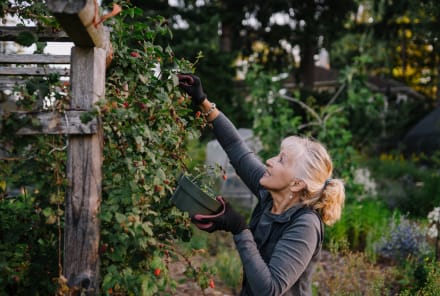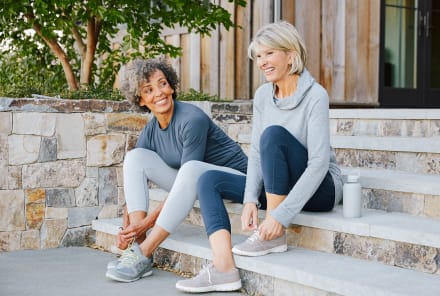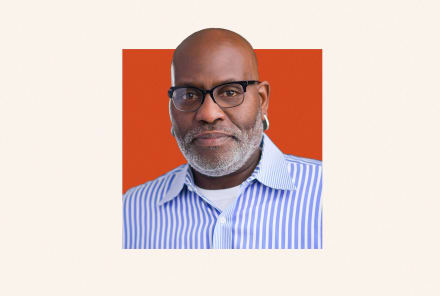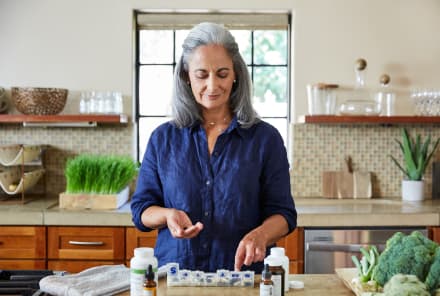Advertisement
The Top 11 Longevity Tips Of 2023, From The mindbodygreen Podcast


It's been a milestone year over at the mindbodygreen podcast. We hit 500 episodes and interviewed a roster of leading well-being experts—from acclaimed nutrition researchers to integrative medicine doctors to health tech founders. As always, we picked their brains for the top science-backed ways to live longer, stronger, and more joyful lives.
Here are 11 longevity takeaways we're taking away from 2023:
Lift heavy things
The quick takeaway: While all movement is good movement, resistance exercise and weightlifting are essential for healthy and comfortable aging. That's why muscle-focused functional medicine practitioner Gabrielle Lyon, D.O. recommends keeping a few kettlebells at home that you can carry, swing, or lift whenever the opportunity strikes.
The expert quote: “God forbid that there is some emergency, you should be trained to pick things up... There is something very important about being strong and having enough healthy muscle mass to support longevity.”
Get to know your ApoB
The quick takeaway: Over 50% of Americans over the age of 65 have atherosclerosis—a chronic inflammatory disease of the arteries1 that's a leading underlying cause of death in this country. On his episode of the podcast, longevity-focused practitioner Peter Attia, MD, explained that ApoB is a major predictor of atherosclerosis and cardiovascular risk that more people should be paying attention to and working to actively lower (here are some ways to get started).
The expert quote: "You can't get atherosclerosis without Apo-B. If you want to eradicate atherosclerosis, all you would have to do is eradicate Apo-B."
Learn more here: What A Longevity-Focused MD Eats In A Day For Optimal Heart Health
Aim for 100 grams of protein per day
The quick takeaway: Not only does protein help keep you full and energized, but the macronutrient is essential for building the muscle we need to age well. And you might not be getting enough of it. As leading protein and amino acid researcher Don Layman, PhD explained on his episode, most active adults will want to take in at least 100 grams of protein daily. To ignite muscle growth, aim to work at least 25 grams of protein and 2.5-3 grams of leucine (an essential amino acid in protein) into each meal.
The expert quote: "We find from a metabolic standpoint, working predominantly with women, that if they get below 100 grams per day, they lose most of the benefits of protein: fatty acid metabolism, insulin sensitivity, weight loss, satiety."
Learn more here: 3 Protein Best Practices, From An Amino Acid Requirements Researcher
Walk at least 8,000 steps a day
The quick takeaway: Kelly and Juliet Starrett have long been leaders in the mobility and movement space. And they have a bone to pick with the idea that in order to be fit, you need to spend a certain amount of time in the gym every week. Instead, they recommend incorporating more functional movement into your daily routine as you're working, doing chores, running errands, etc. Walking 8,000 steps a day is a great goal to start with.
The expert quote: "The research is very clear that when people walk just 8,000 steps, they get the lion's share of benefits. Not 10,000 steps. Not 12,000… 8,000 steps."
Learn more here: 3 Underrated Daily Tips To Stay Mobile As You Get Older
Rethink zone 2 training
The quick takeaway: Speaking of exercise, another piece of movement advice that is quickly becoming antiquated is the idea that everyone needs to spend the majority of their training time in zone 2 (low-intensity cardio). Female physiology and nutrition science researcher Stacy Sims, PhD tipped us off that most research on zone 2 is based on male physiology and data—and women might actually benefit from working more high-intensity training into their routines.
The expert quote: "When we look at men, yes, they need to do Zone 2 to increase mitochondrial density and the respiratory capacity of mitochondria, but women don't...Women need to do more of that high-intensity work."
Learn more here: What Women Need To Know About The 3 Buzziest Longevity Topics
Think yourself younger
The quick takeaway: One of the most fascinating studies we covered on the podcast this year was psychology and mindfulness researcher Ellen Langer, PhD's "counterclockwise study2," in which she put up a group of older men in a home designed to be from 20 years earlier—complete with old magazines, news, sports, TV, music, and photos of their younger selves. Within a week, participants reported improvements in memory and strength. They were literally able to think themselves younger.
The expert quote: "The control we have over our health is enormous, if only we didn't accept limits."
Love yourself and others
The quick takeaway: Holistic doctor Gladys McGarey, M.D. has accumulated a lot of wisdom in her 102 years on this planet, and one of her biggest lessons is that love is a great healer. In her podcast episode, she points to research showing that those who provide emotional support to others tend to live longer lives3, and people who practice lovingkindness meditation have longer telomeres4 (a biomarker of healthy aging) than those who don't.
The expert quote: "When you really learn to love yourself, that's when you learn to love other people... Love really is a great healer in the long run."
Learn more here: A 102-Year-Old MD Shares The 3 Longevity Tips She Swears By
Drink more water
The quick takeaway: You've probably heard that drinking enough water is important for your immune system and digestion. But internal medicine doctor Richard Johnson, M.D let us in on another reason to stay hydrated: kidney health and uric acid levels. Uric acid is a waste product found in the blood that's created when the body breaks down chemicals called purines. It's important to keep levels low, which is something water can help with. Drink up!
The expert quote: "You want to keep your uric acid levels around four or five. When it's high, it predicts the development of kidney disease. It predicts the development of high blood pressure. It predicts the development of obesity."
Microdose gratitude
The quick takeaway: Never been able to make a gratitude practice stick? Psychologist David DeSteno, Ph.D. reminds us that it's not necessary to set aside designated time to express what you're grateful for. Simply incorporating gratitude into your daily rhythm is enough to reap the profound benefits of this much-studied emotion.
The expert quote: "There are all these very brief blessings you can give for lots of things—a beautiful sunset, your health, a beautiful painting, a good night's sleep, whatever it is. It makes you microdose gratitude throughout the day."
Train close to failure—and increase the volume
The quick takeaway: If you tend to lift the same amount of weight or do the same amount of reps every time you hit the gym, dietitian and fitness coach Holly Baxter recommends turning up the volume a bit. Your last 2-3 reps should feel very challenging; that's a sign that your muscles are responding to the movement.
The expert quote: "We need to focus on making sure that we train with close proximity to failure... If you are able to still perform 10 more reps with that same dumbbell or barbell, then you are not effectively signaling your muscles to grow."
Connection is critical
The quick takeaway: Ultimately, the best thing to support your health and longevity isn't some trendy superfood or gadget: It's your community. When mindbodygreen's co-founders welcomed integrative medicine doctor Sara Gottfried, M.D. to the podcast, they discussed the all-important Roseto study5, which found that individuals with strong social connections tend to live longer and are less likely to suffer from heart disease. Consider this your cue to phone a friend today.
The expert quote: "When you are connected with other people, you're sharing your lung biome6 with them. There's a way that it creates health. It changes your genetics7; we know this from social genomics. It creates this upward benevolent cycle that is hard to measure."
7 Sources
- https://www.ncbi.nlm.nih.gov/books/NBK507799/
- https://psycnet.apa.org/record/1990-98072-000
- https://journals.sagepub.com/doi/abs/10.1111/1467-9280.14461
- https://pubmed.ncbi.nlm.nih.gov/23602876/
- https://www.ncbi.nlm.nih.gov/pmc/articles/PMC1695733/
- https://www.nature.com/articles/s41598-018-37298-9
- https://www.ncbi.nlm.nih.gov/pmc/articles/PMC3052688/
Watch Next
Enjoy some of our favorite clips from classes
Enjoy some of our favorite clips from classes
What Is Meditation?
Mindfulness/Spirituality | Light Watkins
Box Breathing
Mindfulness/Spirituality | Gwen Dittmar
What Breathwork Can Address
Mindfulness/Spirituality | Gwen Dittmar
The 8 Limbs of Yoga - What is Asana?
Yoga | Caley Alyssa
Two Standing Postures to Open Up Tight Hips
Yoga | Caley Alyssa
How Plants Can Optimize Athletic Performance
Nutrition | Rich Roll
What to Eat Before a Workout
Nutrition | Rich Roll
How Ayurveda Helps Us Navigate Modern Life
Nutrition | Sahara Rose
Messages About Love & Relationships
Love & Relationships | Esther Perel
Love Languages
Love & Relationships | Esther Perel
What Is Meditation?
Box Breathing
What Breathwork Can Address
The 8 Limbs of Yoga - What is Asana?
Two Standing Postures to Open Up Tight Hips
How Plants Can Optimize Athletic Performance
What to Eat Before a Workout
How Ayurveda Helps Us Navigate Modern Life
Messages About Love & Relationships
Love Languages
Advertisement

This Underconsumed Nutrient Helps Fight Gum Inflammation, Study Shows
Molly Knudsen, M.S., RDN

Research Shows Cognitive Longevity Depends On These 3 Critical Vitamins
Molly Knudsen, M.S., RDN

This Underconsumed Nutrient Helps Fight Gum Inflammation, Study Shows
Molly Knudsen, M.S., RDN

This Underconsumed Nutrient Helps Fight Gum Inflammation, Study Shows
Molly Knudsen, M.S., RDN

Research Shows Cognitive Longevity Depends On These 3 Critical Vitamins
Molly Knudsen, M.S., RDN

This Underconsumed Nutrient Helps Fight Gum Inflammation, Study Shows
Molly Knudsen, M.S., RDN











